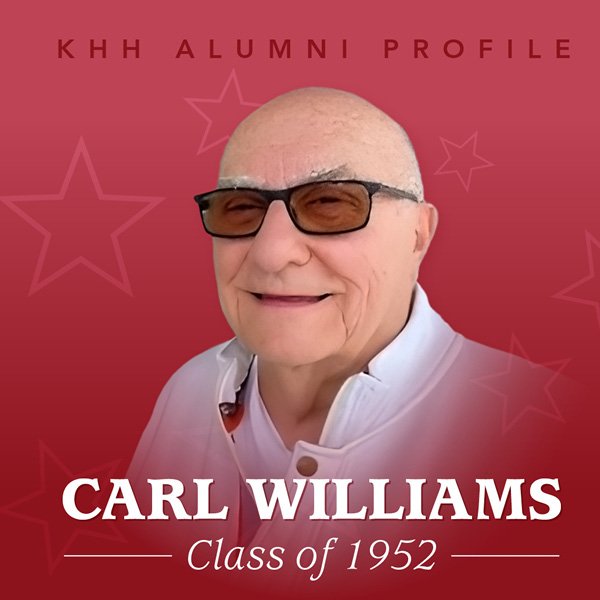When Carl Williams was a young boy, his family lived in New York City. By the time he was just seven years old, he had already fallen in with a group of boys who were setting a poor example. That’s when his mother decided that Kurn Hattin Homes for Children in rural Westminster, Vermont was the best option for Carl, his education, and his future.
As Carl reflects back to those early days, he says, “I was involved with an older crowd and being influenced by their poor choices. I was undisciplined and had already gotten into a serious situation led by an older boy.”
The move to Kurn Hattin Homes positively changed the trajectory of Carl’s life. The transformation was immediate and permanent.
“Kurn Hattin Homes established a foundation that I didn’t have, but truly needed. The adults there turned me into a more disciplined person and made me a focused, goal-oriented individual. The experience taught me respect for people, work, and property,” Carl says. “It also instilled two very important values — honesty and patriotism.”
When Carl was 12, he was held back in school for a year so he could improve his reading skills. He remembers that Mrs. Mayo, wife of Kurn Hattin Homes Director Mr. Mayo, would spend hours reading with him. Carl recalls, “She chose really interesting books, ones with patriotic stories, and I absorbed every word.”
Not only did Carl’s reading skills grow, his spirit of patriotism blossomed.
After graduating from Kurn Hattin Homes, Carl was enrolled in Benjamin Franklin High School back in New York. That experience, however, did not lead to a high school diploma. Carl was a young man with a great sense of adventure and a patriotic streak. So, on his 17th birthday, August 9, 1954, Carl enlisted in the United States Air Force.
During his almost four years in the Air Force, Carl rose in the ranks, traveled the world, earned his GED, and began taking college courses at night. When he re-entered civilian life, his educational pursuits continued and his career took off. Carl’s educational track includes a Bachelor’s degree in Psychology and work toward a Master’s degree. Early on, his professional life included work as a psychometrist at a YMCA vocational service center and as a candidate in the junior executive program at the New York telephone company. After that, Carl moved out to California and became a training officer for the state’s Department of Transportation (DOT). Again, he worked himself up through the ranks until then-Governor Ronald Reagan appointed him to head up the DOT. When Reagan was elected president, he invited Carl to move to Washington, DC and work in his cabinet. The schedule was intense. Carl recalls, “The president invited me to stay at the White House. We worked six days a week, staff meetings every day at 7 AM, and we were done at about 11 PM. I really like to work, but this was not the life for me.”
Carl returned to California and resumed working for the state until he accepted the position as North American representative for Messe Berlin, an international aerospace trade show. He worked there until his retirement in 2012.
Carl says, “When I first retired, I didn’t know what to do with myself.”
That didn’t last long. Through his wife’s family history, Carl learned of a battalion of Japanese-American WWII soldiers who liberated the French town of Bruyères in October of 1944. He has become passionately involved with his own heroic venture of honoring these men and helping to raise money for a new town monument called 555 HILL and a museum dedicated to their memory.

Toward that goal, Carl has written a children’s book called “Marie of Bruyères” that tells the story of the occupation and liberation through the eyes of a French farm girl. Carl says, “I didn’t write the book so I could profit, I did it to honor the soldiers.”
“I’ve had a great life and, I owe a great deal to Kurn Hattin for molding me into a good citizen and equipping me with the education and tools I needed for life,” Carl says. “They took a non-reader and turned me into a writer. What more could one ask of a school?”
When Carl ponders the definition of success, he believes the answer lies is in what brings him the most fulfillment. “What gives me the most satisfaction is what I’m doing now — honoring these heroes among heroes.”
Carl is currently writing a novel about a Japanese-American solider from Montana who volunteers for military service two weeks after the bombing of Pearl Harbor. It details the prejudice and restrictions the young soldier faces because of his heritage. “This story shows that it’s not just the guys who win the medals who deserve praise. There are so many unknown soldiers who were decent, good citizens who lost their lives doing the right thing. There are so many patriots who never get recognized.”
It’s Carl’s turn to be recognized.

